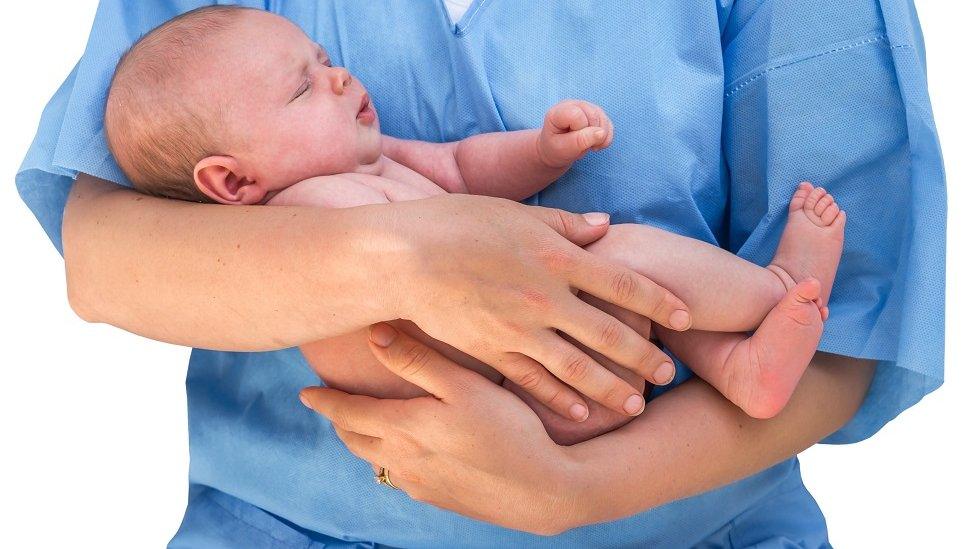Number of nurses and midwives falls for third year in a row
- Published

The new figures are a "stark warning", says the RCN Scotland
The number of nurses and midwives registering to work in Scotland has fallen for the third year in a row.
There were 1,200 fewer registered in March of this year than in 2014.
Figures published by the Nursing Midwifery Council (NMC) show it is a UK-wide problem but Scotland has seen the biggest drop.
It has led to claims of poor morale in the profession where staff are "constantly being asked to do more with less".
And it has highlighted concerns about replacing the large number of people due to retire from nursing and midwifery.
But the Scottish government insisted staffing levels in the NHS have reached record high levels and NHS nurses in Scotland are the highest paid in the UK.
Among a series of findings, the NMC report, external reveals:
There has been a 1.7% drop in the number of people on the NMC register in Scotland since March 2014;
England experienced at 1.4% fall in nurse and midwife numbers during the same period;
In Northern Ireland, the figure dropped by 1.6%, while in Wales it was 0.9%;
In Scotland, the number of people leaving the profession began to overtake those joining in 2014/15.
The gap has continued to widen and by last year, there were 45.2% more leavers than joiners.
Pay freeze
Norman Provan, Associate Director, Royal College of Nursing Scotland there was not a simple explanation for the number of people leaving the profession.
"It is a complicated picture," he said.
"But these figures are a stark warning that nurses have put up with too much for too long. The stress on nursing staff is enormous. They are constantly being asked to do more with less, and that is having an impact on morale and people's decisions about their career.
"Pay is a factor. Nursing staff have had a pay freeze since 2010, and are now around 14% worse off in real terms. Staff have had enough of struggling to make ends meet, and some are leaving the profession to work elsewhere.
"For some time RCN has warned about the number of nurses nearing retirement age, particularly amongst those providing vital services in Scotland's communities. Pension changes mean that nursing staff nearing retirement age are opting to leave early, and Scotland has fewer students applying to nursing courses.
"These factors have all had an impact, and sadly it is patients who will feel the effects of the fall in registered nurses."

The RCM claims midwives are up to £6,000 a year worse off compared to 2011.
Mary Ross-Davie, of the Royal College of Midwives (RCM), told BBC Scotland that the number of midwives leaving the profession before their 40th birthday was a "real worry".
She said: "We need to make sure we are not just making midwifery an attractive career to choose and to study but it's an attractive career to stay in"
Midwives blamed staffing levels, stress, and frustration at the quality of care they are able to give as reasons for leaving the profession in a recent survey.
She added: "We are a degree profession, highly trained professionals and so the pay should reflect that but with the public sector pay cap we've been experiencing since 2011 - there was a pay freeze and then a pay cap - midwives are on average £4,000 - £6,000 a year less well off.
"That really does begin to bite when you're thinking about what you are able to buy and so we need to make sure the pay continues to rise to reflect the increasing workload that midwives are experiencing.
"That's certainly a message I'm getting from midwives when I'm round the country talking to them - they're saying there are far more women having more scans and needing to be induced to go into labour, a lot more women having Caesarean sections and that all increases midwives' workloads so we need to reflect that in the number of midwives that we have and in the way they are paid."
Health Secretary Shona Robison said: "Under this government, NHS staff numbers have risen to a record high level including over 2,700 additional qualified nurses and midwives.
"Nursing and midwifery is by far the largest staff group in the NHS. There is a 4.7% increase in trainee nurses and midwives this year - a fifth successive rise - and we have committed to deliver around 2,600 additional nursing and midwifery training places by the end of this Parliament.
"Most of those who train in Scotland choose to stay and work here. NHS nurses in Scotland are the highest paid in the UK, with those in the main grade (Band 5) being up to £312 per year better off than their counterparts in NHS England."
Responding to the figures, Labour's health spokesman Anas Sarwar said the first minister was "wrong" to cut training places.
He explained: "In 2012, Nicola Sturgeon claimed cutting training places was a sensible way forward in the face of warnings from Labour and trade unions - instead we got a staffing crisis in our hospitals.
"Labour's workforce commission will look at a long-term sustainable solution to the staffing crisis facing our NHS, including scrapping the NHS pay cap.
"For a decade the SNP has been more interested in running a referendum campaign than running our health service. Nicola Sturgeon needs to get back to the day job."